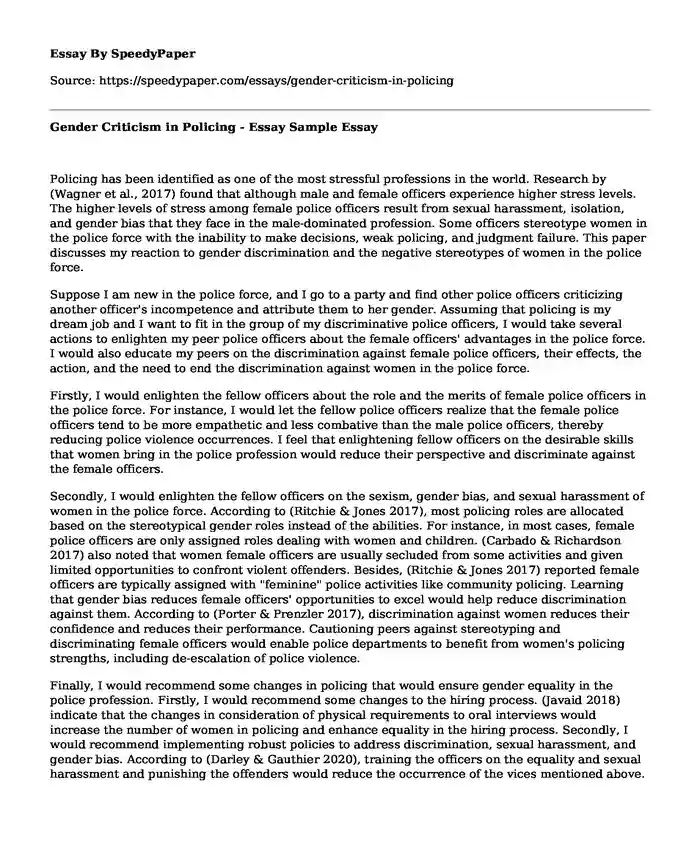Policing has been identified as one of the most stressful professions in the world. Research by (Wagner et al., 2017) found that although male and female officers experience higher stress levels. The higher levels of stress among female police officers result from sexual harassment, isolation, and gender bias that they face in the male-dominated profession. Some officers stereotype women in the police force with the inability to make decisions, weak policing, and judgment failure. This paper discusses my reaction to gender discrimination and the negative stereotypes of women in the police force.
Suppose I am new in the police force, and I go to a party and find other police officers criticizing another officer's incompetence and attribute them to her gender. Assuming that policing is my dream job and I want to fit in the group of my discriminative police officers, I would take several actions to enlighten my peer police officers about the female officers' advantages in the police force. I would also educate my peers on the discrimination against female police officers, their effects, the action, and the need to end the discrimination against women in the police force.
Firstly, I would enlighten the fellow officers about the role and the merits of female police officers in the police force. For instance, I would let the fellow police officers realize that the female police officers tend to be more empathetic and less combative than the male police officers, thereby reducing police violence occurrences. I feel that enlightening fellow officers on the desirable skills that women bring in the police profession would reduce their perspective and discriminate against the female officers.
Secondly, I would enlighten the fellow officers on the sexism, gender bias, and sexual harassment of women in the police force. According to (Ritchie & Jones 2017), most policing roles are allocated based on the stereotypical gender roles instead of the abilities. For instance, in most cases, female police officers are only assigned roles dealing with women and children. (Carbado & Richardson 2017) also noted that women female officers are usually secluded from some activities and given limited opportunities to confront violent offenders. Besides, (Ritchie & Jones 2017) reported female officers are typically assigned with "feminine" police activities like community policing. Learning that gender bias reduces female officers' opportunities to excel would help reduce discrimination against them. According to (Porter & Prenzler 2017), discrimination against women reduces their confidence and reduces their performance. Cautioning peers against stereotyping and discriminating female officers would enable police departments to benefit from women's policing strengths, including de-escalation of police violence.
Finally, I would recommend some changes in policing that would ensure gender equality in the police profession. Firstly, I would recommend some changes to the hiring process. (Javaid 2018) indicate that the changes in consideration of physical requirements to oral interviews would increase the number of women in policing and enhance equality in the hiring process. Secondly, I would recommend implementing robust policies to address discrimination, sexual harassment, and gender bias. According to (Darley & Gauthier 2020), training the officers on the equality and sexual harassment and punishing the offenders would reduce the occurrence of the vices mentioned above.
In summary, women contribute to the reduction of violent occasions in the policing. However, gender bias, sexual harassment, and discrimination magnifies women's stress levels in policing, one of the most stressful professions globally. Stress resulting from the discrimination against female police officers reduces their effectiveness. There is a need to enlighten the officers on the advantages of women in policing, inequality and discrimination, and formulate strong policies to reduce gender discrimination, hence enhancing equality and optimum performance in policing.
References
Carbado, D. W., & Richardson, L. S. (2017). The black police: policing our own.
Darley, M., & Gauthier, J. (2020). Policing and Gender in France. Policing in France, 310-325.
Javaid, A. (2018). The unheard victims: gender, policing and sexual violence. Policing and Society, 1-17.
Porter, L. E., & Prenzler, T. (2017). Police officer gender and excessive force complaints: An Australian study. Policing and society, 27(8), 865-883.
Ritchie, A. J., & Jones-Brown, D. (2017). Policing race, gender, and sex: A review of law enforcement policies. Women & Criminal Justice, 27(1), 21-50.
Wagner, N., Rieger, M., Bedi, A., & Hout, W. (2017). Gender and policing norms: Evidence from survey experiments among police officers in Uganda. Journal of African Economies, 26(4), 492-515.
Cite this page
Gender Criticism in Policing - Essay Sample. (2023, Dec 16). Retrieved from https://speedypaper.com/essays/gender-criticism-in-policing
Request Removal
If you are the original author of this essay and no longer wish to have it published on the SpeedyPaper website, please click below to request its removal:
- Compare and Contrast Essay Example on Racism and Ethnicity
- The Politics of Implementation - Free Essay with an Article Analysis
- Disability Discrimination Essay Sample
- Free Essay Sample - Social Mobility in the US
- Literature on Slavery and Freedom - Paper Example
- Effects of Media Violence on Children - Paper Sample
- Paper Sample on Eugenics in America: Unraveling the Historical Impact on Race, Sex, and Disability
Popular categories





